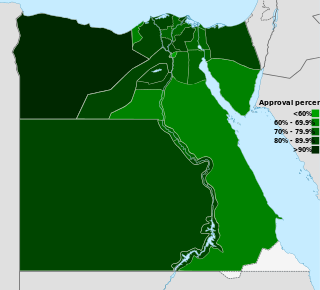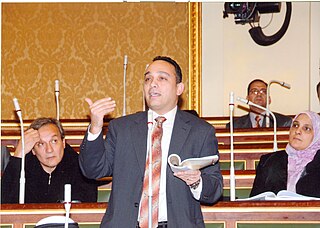
The politics of Egypt is based on republicanism, with a semi-presidential system of government, established following the Egyptian Revolution of 2011, and the resignation of President Hosni Mubarak. The President of Egypt is elected for a maximum of two four-year terms and the Parliament is unicameral and unbiased. The President can appoint up to 5% of the total number of seats in Parliament, and can also dissolve it. Parliament can also impeach the President. Egypt was traditionally ruled by royals until 1952, but the first free elected President was in 2006. The Parliament of Egypt is the oldest legislative chamber in Africa and the Middle East.

A peace treaty is an agreement between two or more hostile parties, usually countries or governments, which formally ends a state of war between the parties. It is different from an armistice, which is an agreement to stop hostilities, or a surrender, in which an army agrees to give up arms, or a ceasefire or truce in which the parties may agree to temporarily or permanently stop fighting.

Iran elects on national level a head of state and head of government, a legislature, and an "Assembly of Experts". Also City and Village Council elections are held every four years throughout the country. The president is elected for a four-year term by the people. The Parliament or Islamic Consultative Assembly has 290 members, elected for a four-year term in multi- and single-seat constituencies. Elections for the Assembly of Experts are held every eight years. All candidates have to be approved by the Guardian Council. See Politics of Iran for more details.

Elections in Egypt are held for the President and a unicameral legislature. The President of Egypt is elected for a four-year term by popular vote.

Elections in Rwanda take place within the framework of a multi-party democracy and a presidential system. The President and majority of members of the Chamber of Deputies are directly elected, whilst the Senate is indirectly elected and partly appointed.

Parliamentary life in Egypt has been a mark of Egyptian civilizations along its history. In modern history, parliamentary life started as early as 1824 while representative parliamentary life did not start until 1866. In 2016, Egypt celebrated the 150th anniversary of Parliamentary life in their country.

An independence referendum was held in the Republic of Georgia on 31 March 1991. It was approved by 99.5% of voters.

The 2005 Egyptian constitutional referendum took place in Egypt on 25 May 2005. The referendum was on a proposed change to the constitution of Egypt which would establish direct elections for the presidency. The opposition parties called for a boycott of the vote, which was passed by a large majority.

A presidential election was held in Egypt in two rounds, the first on 23 and 24 May 2012 and the second on 16 and 17 June. The Muslim Brotherhood declared early 18 June 2012, that its candidate, Mohamed Morsi, won Egypt's presidential election, which would be the first victory of an Islamist as head of state in the Arab world. It was the second presidential election in Egypt's history with more than one candidate, following the 2005 election, and the first presidential election after the 2011 Egyptian revolution which ousted president Hosni Mubarak, during the Arab Spring. Morsi, however, lasted little over a year before he was ousted in a military coup in July 2013.

A double referendum was held in Egypt on 23 June 1956. The two issues were the candidacy of Gamal Abdel Nasser for the post of president, and a new constitution. Both were approved, with the official figures showing 99.9% in favour of Nasser's candidacy and 99.8% in favour of the constitution.

A constitutional referendum was held in Egypt on 22 May 1980. The amendments would create the Shura Council, an upper house for the country's Parliament, and were approved by 99% of voters.

A constitutional referendum was held in Egypt on 11 September 1971. The changes to the constitution were approved by 99.98% of voters, with a turnout of 95.1%.

A parliamentary election to the People's Assembly of Egypt was held from 28 November 2011 to 11 January 2012, following the revolution that ousted President Hosni Mubarak, after which the Supreme Council of the Armed Forces (SCAF) dissolved the parliament of Egypt. However the dissolution was ruled unconstitutional and Parliament was reinstated. Originally, the elections had been scheduled to be held in September 2011, but was postponed amid concerns that established parties would gain undue advantage.

A constitutional referendum was held in Egypt on 19 March 2011, following the 2011 Egyptian revolution. More than 14 million (77%) were in favour, while around 4 million (23%) opposed the changes; 41% of 45 million eligible voters turned out to vote.

The Egyptian Social Democratic Party is a social liberal and a social democratic party in Egypt. It was founded after the 2011 Egyptian Revolution by the merger of two minor liberal parties, the Liberal Egyptian Party, and the Egyptian Democratic Party on 29 March 2011.

The al‑Nour Party, or "Party of The Light", is one of the political parties created in Egypt after the 2011 Egyptian Revolution. It has an ultra-conservative Islamist ideology, which believes in implementing strict Sharia law. It has been described as the political arm of the Salafi Call Society, and "by far the most prominent" of the several new Salafi parties in Egypt, which it has surpassed by virtue of its "long organizational and administrative experience" and "charismatic leaders". Its political aim is to establish a theocratic state on the lines of Wahhabism like in Saudi Arabia. Saudi Arabia was found to be the main financer of the party according to the public German television news service ARD (broadcaster).

Shura Council elections were held in Egypt between 29 January and 22 February 2012. The Freedom and Justice Party emerged as the largest party in the Council, winning 105 of the 180 elected seats.

Freddy Safwat Naguib Elbaiady to an Egyptian family. He is an Egyptian political and social activist. Resigned Member of the Shura Council, the upper house of the Egyptian parliament, the senate house,.

General elections for the Consultative Assembly were held in Oman on 25 October 2015.













